See also
- Tithonos, son of Eos and Cephalus in Greek mythology
- Tithonian, the final stage of the Late Jurassic epoch
- Titon et l'Aurore , an opera by the French composer Jean-Joseph de Mondonville
Tithonus is a figure in Greek mythology known for being granted immortality without eternal youth.
Tithonus may also refer to:
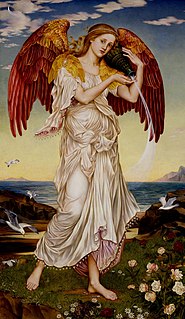
In Greek mythology, Eos is a Titaness and the goddess of the dawn, who rose each morning from her home at the edge of the Oceanus.

Sappho was an Archaic Greek poet from the island of Lesbos. Sappho is known for her lyric poetry, written to be sung while accompanied by music. In ancient times, Sappho was widely regarded as one of the greatest lyric poets and was given names such as the "Tenth Muse" and "The Poetess". Most of Sappho's poetry is now lost, and what is extant has mostly survived in fragmentary form; only the "Ode to Aphrodite" is certainly complete. As well as lyric poetry, ancient commentators claimed that Sappho wrote elegiac and iambic poetry. Three epigrams attributed to Sappho are extant, but these are actually Hellenistic imitations of Sappho's style.
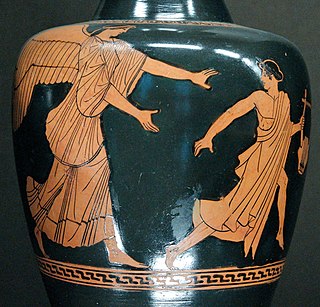
In Greek mythology, Tithonus was the lover of Eos, Goddess of the Dawn. He was a prince of Troy, the son of King Laomedon by the Naiad Strymo (Στρυμώ). The mythology reflected by the fifth-century vase-painters of Athens envisaged Tithonus as a rhapsode, as attested by the lyre in his hand, on an oinochoe of the Achilles Painter, circa 470–460 BC.
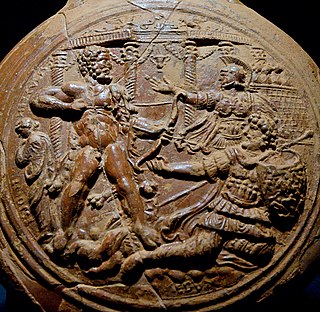
In Greek mythology, Laomedon was a Trojan king, son of Ilus and thus nephew of Ganymede and Assaracus.
In Greek mythology, Leucippe is the name of the following individuals:
In Greek mythology, the name Emathion refers to four individuals.
In Greek mythology, Idmon may refer to the following individuals:

Aurōra is the Latin word for dawn, and the goddess of dawn in Roman mythology and Latin poetry. Like Greek Eos and Rigvedic Ushas, Aurōra continues the name of an earlier Indo-European dawn goddess, Hausos.
In Greek mythology, Praxidice may refer to the following characters:
Prometheus is a figure in Greek mythology.
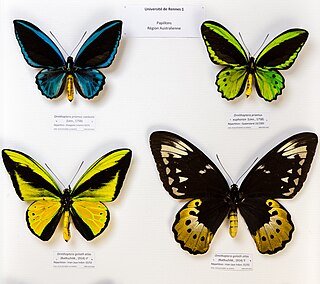
Ornithoptera is a genus of birdwing butterflies found in the northern portion of the Australasian realm, east of Weber's line; the Moluccas, New Guinea, the Solomon Islands, and northeastern Australia. Except for Ornithoptera richmondia, which may be found in far northeastern New South Wales, Australia, therefore the southernmost distribution of birdwings. This genus includes the two largest butterfly species in the world, the Queen Alexandra's birdwing and the Goliath birdwing. Ornithoptera species are highly prized by insect collectors because they are rare, large, and stunningly beautiful, arguably the most beautiful butterflies in the world.

Troides helena, the common birdwing, is a butterfly belonging to the family Papilionidae. It is often found in the wildlife trade due to its popularity with butterfly collectors. The butterfly has seventeen subspecies.
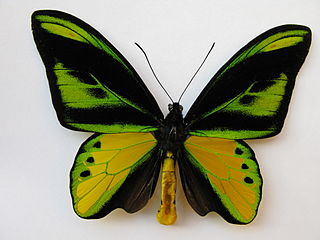
Ornithoptera chimaera, the chimaera birdwing, is a birdwing butterfly of the family Papilionidae. It is found in mountain areas of New Guinea, 1000 meters above sea level.

"Tithonus" is a poem by the Victorian poet Alfred, Lord Tennyson (1809–92), originally written in 1833 as "Tithon" and completed in 1859. It first appeared in the February edition of the Cornhill Magazine in 1860. Faced with old age, Tithonus, weary of his immortality, yearns for death. The poem is a dramatic monologue with Tithonus addressing his consort Eos, the goddess of the dawn.

"Tithonus" is the tenth episode of the sixth season of the American science fiction television series The X-Files. It premiered on the Fox network on January 24, 1999. The episode was written by Vince Gilligan, and directed by Michael W. Watkins. The episode is a "Monster-of-the-Week" story, unconnected to the series' wider mythology. "Tithonus" earned a Nielsen household rating of 9.2, being watched by 15.90 million people in its initial broadcast. The episode received positive reviews.

Greek mythology is the body of myths originally told by the ancient Greeks, and a genre of Ancient Greek folklore. These stories concern the origin and nature of the world, the lives and activities of deities, heroes, and mythological creatures, and the origins and significance of the ancient Greeks' own cult and ritual practices. Modern scholars study the myths to shed light on the religious and political institutions of ancient Greece, and to better understand the nature of myth-making itself.
Titone is an Italian surname. Notable people with the surname include:

Insects have appeared in mythology around the world from ancient times. Among the insect groups featuring in myths are the bee, fly, butterfly, cicada, dragonfly, praying mantis and scarab beetle.

The Tithonus poem, also known as the old age poem or the New Sappho, is a poem by the archaic Greek poet Sappho. It is part of fragment 58 in Eva-Maria Voigt's edition of Sappho. The poem is from Book IV of the Alexandrian edition of Sappho's poetry. The poem was first published in 1922, after a fragment of papyrus on which it was partially preserved was discovered at Oxyrhynchus in Egypt. Papyrus fragments published in 2004 almost completed the poem, drawing international media attention. The poem is one of very few substantially complete works by Sappho, and deals with the effects of ageing. There is scholarly debate about where the poem ends, as four lines previously thought to have been part of the poem are not found on the 2004 papyrus.